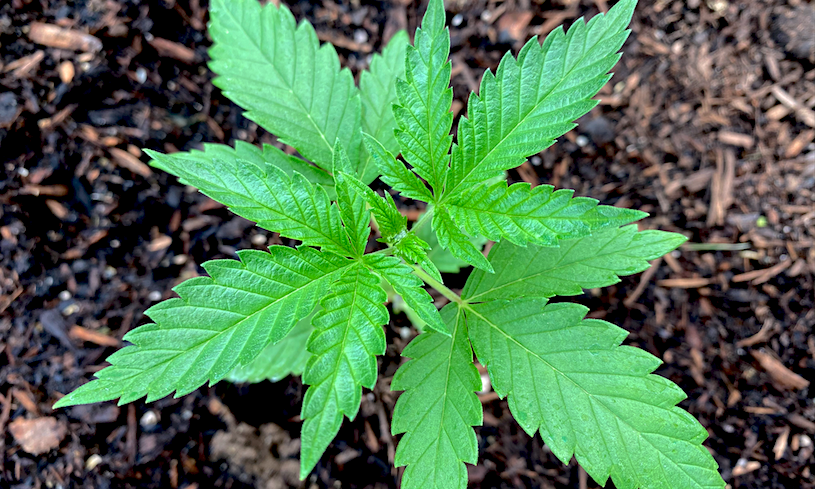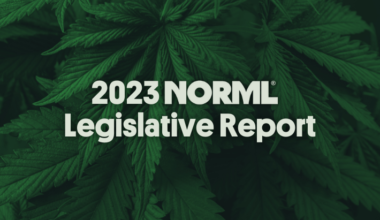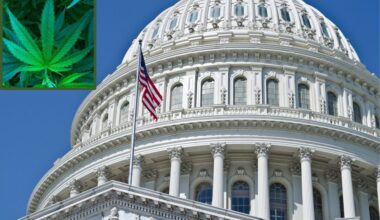A top Rhode Island senator says lawmakers are “very close” to reaching a deal on a marijuana legalization bill that could be taken up during a special session this fall.
Senate President Dominick Ruggerio (D) was asked for a status update on negotiations that have been taking place on the reform proposal since lawmakers adjourned for the session. He told WPRI-TV that while there are still outstanding issues to be resolved, he believes legalization will be taken up before the end of the year.
“We’ve had people working on that issue since we’ve left the session this year,” he said.
“We sent legislation—which we think is a very good piece of legislation—over to the House before we left in June,” the senator said, referring to a legalization bill that his chamber approved in June. “They are working on that legislation with some of the House people at this point in time.”
A special session has yet to be called, but Ruggerio said he feels an agreement on cannabis reform will be made in time to call lawmakers back to the State House within the coming months.
“We’re hoping we can get cannabis done. We’re very close. We’re making progress, but we’re not there at this point in time,” he said. “There’s a couple stumbling blocks that they are addressing right now, and we’ll see how that shakes out.”
What remains to be seen is whether the negotiated legalization bill that’s ultimately produced will satisfy advocates and progressive lawmakers, some of whom have rallied behind an agenda for reform that emphasizes the need for bold social equity provisions.
Negotiators have been working to reconcile competing proposals from the House, Senate and Gov. Daniel McKee (D). While the bills each contain components meant to address the harms of marijuana criminalization, the coalition led by Reclaim Rhode Island says they’re insufficient. Advocates and supportive lawmakers have laid out specific items that they want to see incorporated such as setting aside half of cannabis business licenses for communities most impacted by prohibition.
“We can’t reverse the harm of the war on drugs, but we can start to repair it by passing automatic expungement and waiving all related fines, fees and court debt,” Rep. Karen Alzate (D), chair of the Rhode Island Legislative Black and Latino Caucus, said earlier this month. “This bold legalization plan offers us the chance to turn a new leaf for the Ocean State, and it’s time we take it.”
Ruggerio, for his part, said he does feel that the legalization bill that was approved in the Senate contained “very strong social justice provisions” and the expungements provision is “as close to automatic as practical.”
Reclaim Rhode Island isn’t the only group pushing lawmakers to expeditiously work to pass legalization. It’s part of a coalition of 10 civil rights and drug policy reform advocacy groups—including the Rhode Island chapters of the ACLU and NAACP—that recently demanded that lawmakers move ahead with enacting marijuana reform in the state before the end of 2021.
House Speaker Joe Shekarchi (D) said in July that while there’s not yet a consensus among legislators and the governor on a deal to legalize marijuana, it’s still a “workable” issue and would be prioritized if negotiations succeed this summer and a special session is convened this fall.
The speaker said this month that bicameral negotiators “are continuing to have productive discussions about the significant policy implications associated with legalizing marijuana for personal use, including, but not limited to, some of the issues raised today at the press conference” by activists and lawmakers.
Rep. Scott Slater (D), for his part, recently told Marijuana Moment that “things are still where they were” prior to the end of session. Lawmakers are “trying to figure out a reconciliation between my bill, the Senate’s and the governor’s.”
Meetings over the summer have been “mostly informal” so far, the representative said. “I think we can get there before next year. It will not be perfect, and I am sure a work in progress.”
Ruggerio said in July that he’s not disappointed the House hasn’t advanced legalization legislation yet and that “what we really wanted to do was send it over and have them take a look at it” when his chamber passed its cannabis reform measure.
Shekarchi, for his part, previously said that he feels reform is “inevitable.”
A key disagreement between the House, Senate and governor’s office concerns who should have regulatory authority over marijuana. Ruggerio was pressed on the issue during a recent interview and said members of his chamber agree that “a separate commission is the way to go with respect to this.”
The House and McKee, on the other hand, want the program to be managed by the state Department of Business Regulation (DBR). Ruggerio noted that “it was difficult to negotiate on a bill when the House bill really didn’t come until late in the session.”
Senate Majority Leader Mike McCaffrey (D) was also recently asked about provisions related to allowing local municipalities to opt out of allowing marijuana businesses to operate in their area. He said “once the legislation is passed and whatever form is passed in, the communities have an opportunity to opt out.”
“They have an opportunity to opt out if the community doesn’t want to participate in it,” he said. “That’s their decision—however, they don’t get the funds that would come from the sales in that community.”
The majority leader also noted that neighboring states like Connecticut and Massachusetts have enacted legalization, and that adds impetus for the legislature to pursue reform in the state.
Shekarchi, meanwhile, said in July that he doesn’t intend to let regional pressure dictate the timeline for when Rhode Island enacts a policy change. Social equity, licensing fees, labor agreements and home grow provisions are among the outstanding matters that need to be addressed, the speaker said.
The House Finance Committee held a hearing on Slater’s legalization measure in June.
The governor previously told reporters that while he backs legalization it is “not like one of my highest priorities,” adding that “we’re not in a race with Connecticut or Massachusetts on this issue.”
“I think we need to get it right,” he said, pointing to ongoing discussions with the House and Senate.
The House Finance Committee discussed the governor’s proposal to end prohibition at an earlier hearing in April.
Both the governor and the leaders’ legalization plans are notably different than the proposal that former Gov. Gina Raimondo (D) had included in her budget last year. Prior to leaving office to join the Biden administration as commerce secretary, she called for legalization through a state-run model.
McKee gave initial insights into his perspective on the reform in January, saying that “it’s time that [legalization] happens” and that he’s “more leaning towards an entrepreneurial strategy there to let that roll that way.”
Shekarchi, meanwhile, has said he’s “absolutely” open to the idea of cannabis legalization and also leans toward privatization.
Late last year, the Senate Finance Committee began preliminary consideration of legalization in preparation for the 2021 session, with lawmakers generally accepting the reform as an inevitability. “I certainly do think we’ll act on the issue, whether it’s more private or more state,” Sen. Ryan Pearson (D), who now serves as the panel’s chairman, said at the time.
Meanwhile, the governor in July signed a historic bill to allow safe consumption sites where people could use illicit drugs under medical supervision and receive resources to enter treatment. Harm reduction advocates say this would prevent overdose deaths and help de-stigmatize substance misuse. Rhode Island is the first state to allow the facilities.
The Senate Judiciary Committee also held a hearing in March on legislation that would end criminal penalties for possessing small amounts of drugs and replace them with a $100 fine.
Pennsylvania Senators Will Consider DUI Protections For Medical Marijuana Patients At Hearing
Photo courtesy of Brian Shamblen.
Medical Disclaimer:
The information provided in these blog posts is intended for general informational and educational purposes only. It is not a substitute for professional medical advice, diagnosis, or treatment. Always seek the advice of your physician or other qualified healthcare provider with any questions you may have regarding a medical condition. The use of any information provided in these blog posts is solely at your own risk. The authors and the website do not recommend or endorse any specific products, treatments, or procedures mentioned. Reliance on any information in these blog posts is solely at your own discretion.







